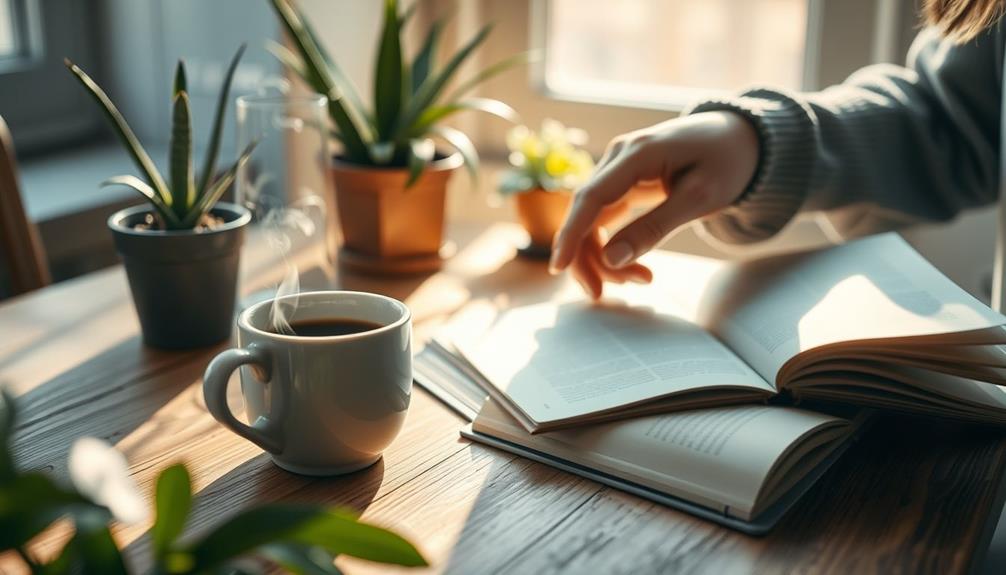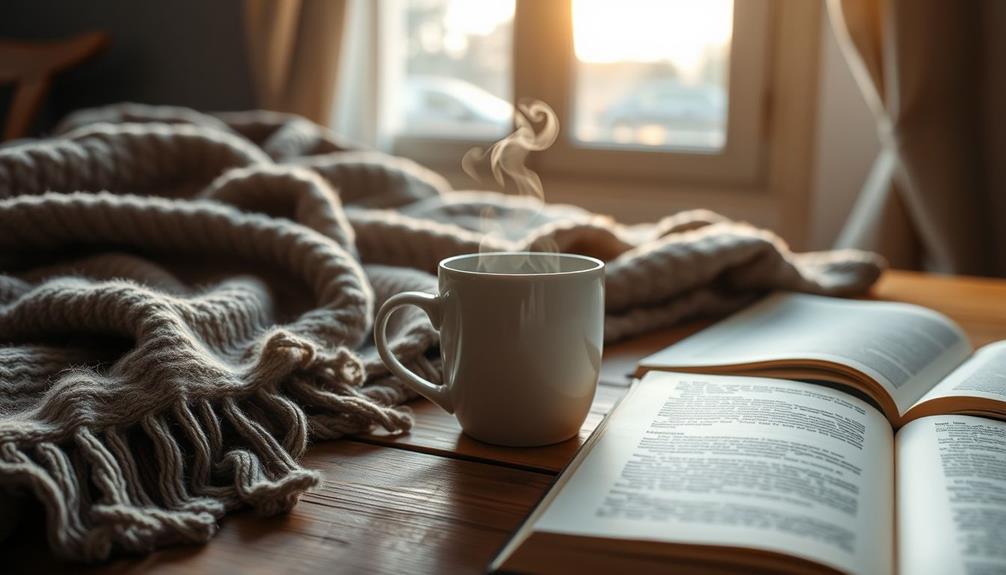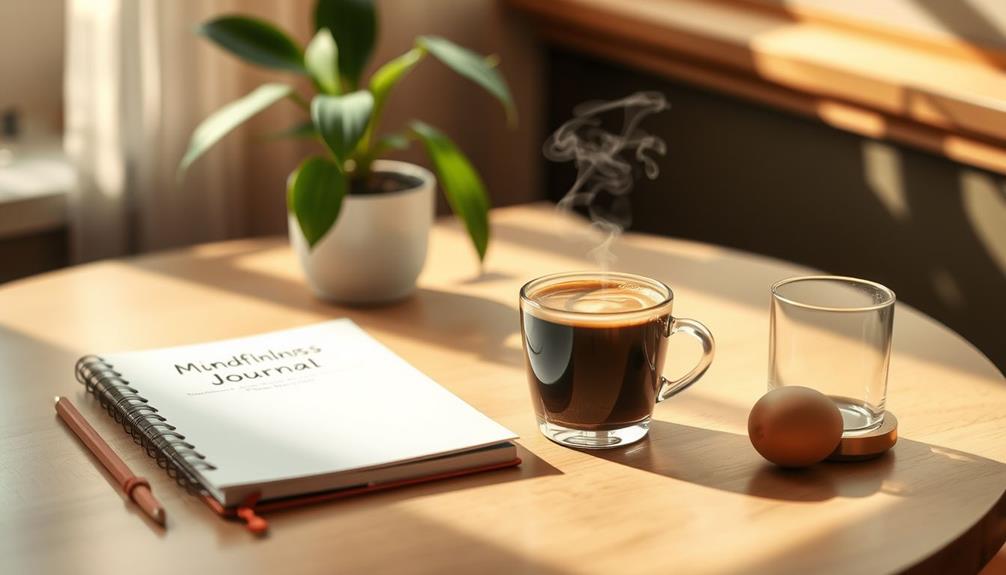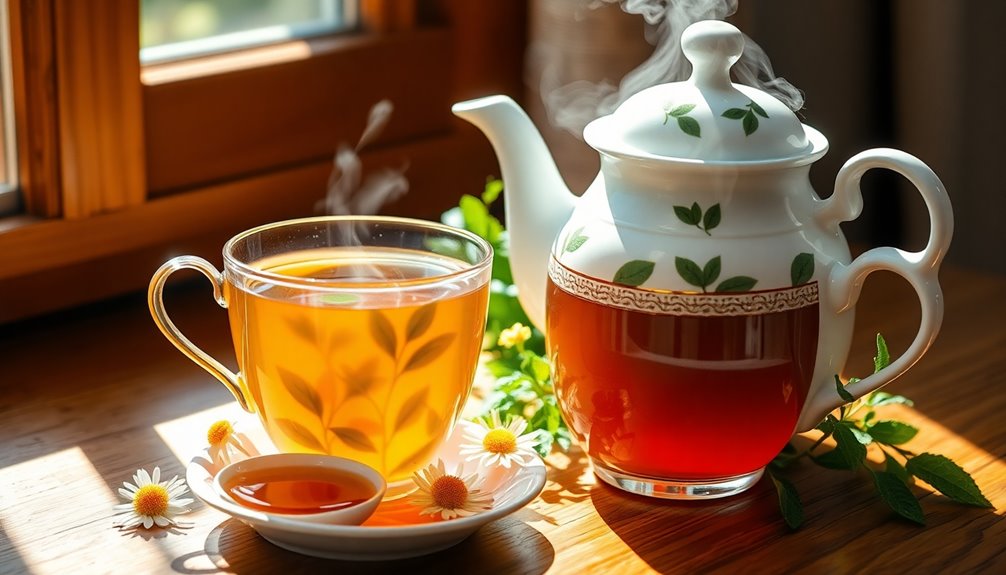Your daily coffee ritual is more than just a habit; it greatly influences your mental well-being. Enjoying a cup can boost your mood and alertness, serving as a moment of self-care. This routine fosters mindfulness, reduces stress, and strengthens social bonds with friends. However, moderation is key; while 2-3 cups may lower anxiety and depression risk, excessive caffeine can lead to sleep disruptions and increased anxiety. Understanding these dynamics helps maintain balance in your routine, ensuring you reap the benefits without drawbacks. There’s much more to uncover about your relationship with that daily cup of coffee.
Key Takeaways
- Daily coffee rituals enhance mood, alertness, and mental well-being through routine and self-care practices.
- Moderate caffeine consumption (2-3 cups daily) is linked to lower risks of depression and anxiety.
- Coffee rituals foster social connections, which are crucial for emotional health and community support.
- Caffeine can serve as a coping mechanism, but excessive intake may lead to anxiety and sleep disturbances.
- Recognizing psychological dependence on caffeine helps maintain balance and promotes healthier coping strategies.
Benefits of Coffee Rituals

Many people find that incorporating coffee rituals into their daily routines can greatly enhance their well-being. Engaging in these rituals not only boosts your mood and alertness but also serves as a crucial form of self-care. By enjoying coffee, especially with friends, you strengthen social connections, which is essential for mental well-being.
Exploring various brewing methods can add a delightful variety to your coffee experience, further enriching these rituals.
Research shows that moderate consumption of coffee is linked to a lower risk of depression and anxiety. The familiar routine of brewing and savoring a cup can reduce stress and create a comforting structure in your day. As you focus on the preparation, you practice mindfulness, allowing yourself a moment of peace amid life’s chaos.
Moreover, thinking about coffee, including its aromas and rituals, can increase your arousal and enhance cognitive performance. This mental boost helps you tackle tasks more effectively and think more concretely.
Negative Impacts of Caffeine

While coffee rituals can enhance well-being, it’s important to recognize that caffeine can also have adverse effects. Consuming too much caffeine can remarkably reduce your sleep quantity by about 10% and your sleep quality by nearly 40%. This lack of restorative sleep can lead to long-term sleep disturbances, ultimately impacting your mental well-being.
Additionally, the importance of selecting the right cold medication can’t be overlooked, as certain medications can also contribute to sleep issues.
You might also notice increased anxiety levels while drinking coffee, with notable rises in psychological distress observed during consumption. This can hinder your ability to focus and relax.
Moreover, if you try to cut back on caffeine, you could experience withdrawal symptoms like headaches and irritability, which can interfere with your daily activities and overall mental functioning.
Chronic overconsumption can create a dependency, where you need larger amounts of caffeine to feel the same effects. Unfortunately, the negative impacts on sleep quality can linger for up to three days after your last caffeine intake, further affecting your cognitive performance.
Social Aspects of Coffee Consumption

Coffee consumption isn’t just about the beverage itself; it’s often a social experience that enhances enjoyment and fosters deeper connections with friends and family. Sharing a cup can create a sense of community, essential for emotional support and social interaction. Engaging in regular coffee rituals strengthens interpersonal relationships, reinforcing social bonds that contribute positively to your mental well-being.
| Social Benefits of Coffee Consumption | Impact on Mental Well-being |
|---|---|
| Enhances enjoyment | Promotes relaxation |
| Fosters connections | Lowers depression risk |
| Creates a sense of community | Increases feelings of happiness |
| Serves as stress relief | Reduces anxiety |
| Strengthens social bonds | Encourages positive mood states |
Participating in coffee-related gatherings can greatly boost your mood and create a shared experience that alleviates stress. Studies show that moderate coffee consumption in social settings is linked to lower risks of depression and anxiety. So, the next time you sip your favorite brew with friends, remember that it’s not just coffee; it’s a ritual that enhances your overall mental health and wellbeing.
Psychological Dependence on Caffeine

You might find that your daily coffee ritual has become a cornerstone of your routine, helping you tackle stress and fatigue.
However, relying on caffeine as a coping mechanism can lead to withdrawal symptoms that cloud your mental clarity when you try to cut back.
Additionally, just as with juice diets that may lead to nutrient deficiencies if not balanced, understanding this dependence is vital for maintaining your mental well-being.
juice diets can provide insights into the importance of balance in your daily consumption habits.
Daily Rituals and Routine
Mornings often begin with the familiar aroma of freshly brewed coffee, a ritual that many people embrace as fundamental to their daily routine. This daily coffee consumption can lead to a psychological dependence, as you might find yourself relying on caffeine to kick-start your day.
The comforting ritual of brewing and savoring your coffee not only signals the start of your morning but also becomes intertwined with your sense of mental well-being. There are numerous coffee varieties available, each offering unique flavor profiles that enhance the experience of this daily ritual, encouraging enthusiasts to explore their favorites and enjoy the benefits of quality coffee numerous varieties available.
As you sip your coffee, you may notice that withdrawal symptoms like headaches or irritability can occur if you skip your usual cup. This signals a deeper reliance on caffeine, reinforcing its role in your daily routine.
Social interactions often revolve around coffee, enhancing feelings of connection while further entrenching habitual consumption. Over time, you might develop a tolerance, requiring more caffeine to achieve that same boost of alertness, which only deepens your dependence.
While coffee can certainly elevate your mood and productivity, it’s important to be aware of how this ritual shapes your daily life. Balancing your coffee habits can help guarantee that your relationship with caffeine remains a positive aspect of your mental well-being.
Caffeine as Coping Mechanism
While many enjoy the energizing effects of caffeine, it’s crucial to recognize how it can become a coping mechanism during stressful times. Regular caffeine consumption often leads to psychological dependence, where you rely on that daily cup to function and feel motivated. When stress hits, reaching for coffee can feel like a quick fix, enhancing your mood and cognitive performance.
However, this reliance can backfire. If you try to cut back, you might experience withdrawal symptoms such as headaches, fatigue, and irritability—commonly referred to as “mental fog.” Social rituals around coffee drinking further entrench this dependence, as these moments become linked with relaxation and bonding.
Here’s a table that highlights the effects of caffeine as a coping mechanism:
| Benefit | Drawback | Impact on Mental Well-being |
|---|---|---|
| Enhances mood | Psychological dependence | Temporary relief |
| Boosts energy | Withdrawal symptoms | Long-term reliance |
| Social bonding | Increased stress levels | Mixed effects |
Recognizing these dynamics can help you understand your relationship with caffeine and its impact on your mental well-being.
Withdrawal and Mental Clarity
Caffeine withdrawal can feel like a heavy weight on your mind, clouding your thoughts and making it hard to focus. When you rely on coffee for daily motivation, that psychological dependence can lead to a cascade of withdrawal symptoms, including headaches, fatigue, and irritability.
These symptoms can severely undermine your mental clarity, making it difficult to perform everyday tasks. Understanding your financial health is essential, as stress from financial issues can compound the effects of caffeine withdrawal on your cognitive function.
As your tolerance builds, you might find yourself needing more coffee consumption to achieve the same energy-boosting effects. This cycle reinforces your reliance on caffeine, highlighting its addictive potential.
When you skip your usual cup or two, the cognitive fog sets in, and your productivity takes a hit. The social rituals around coffee can further entrench this dependence, often encouraging you to use caffeine as a crutch for stress and fatigue.
Understanding how withdrawal affects your mental clarity can empower you to reassess your relationship with caffeine. By acknowledging this dependence, you can explore healthier coping strategies that won’t leave you feeling mentally drained when you miss your daily fix.
Caffeine and Mental Health

Caffeine can boost your mood and sharpen your focus, making those morning cups of coffee feel like a necessity.
However, while moderate consumption might help reduce feelings of anxiety, overdoing it can lead to increased stress and sleepless nights.
It’s important to find the right balance to enjoy coffee’s benefits without compromising your mental health.
Caffeine’s Mood Enhancements
Many coffee lovers appreciate their daily brew not just for its rich flavor but also for its mood-boosting benefits. Research shows that moderate caffeine consumption, like enjoying 2-3 cups of coffee daily, can lower the risk of depression and anxiety.
Notably, as the demand for jobs in various sectors, including AI Ethicist Jobs, grows, people may also seek comfort in their coffee rituals to enhance focus and creativity. You’ll likely find that caffeine enhances your mood and increases alertness, making you feel more energized throughout the day.
Here are some key benefits of caffeine for your mood:
- Increased alertness: Caffeine can help you stay awake and focused.
- Enhanced mood: Drinking coffee is linked to improved overall mood.
- Cognitive performance: It sharpens your attention and reaction times.
- Reduced fatigue: Caffeinated coffee can alleviate feelings of tiredness.
- Lower depression risk: Regular consumption may decrease your chances of experiencing depression.
While these benefits are appealing, moderation is essential. Excessive coffee consumption can lead to anxiety and sleep disturbances, counteracting the positive effects.
Anxiety and Caffeine Consumption
For those who enjoy their daily coffee ritual, it’s important to contemplate how caffeine affects anxiety levels.
Moderate coffee consumption—about 2-3 cups daily—can actually lower your risk of depression and anxiety, as highlighted by recent studies. Notably, individuals with emotional dysregulation, like those with Borderline Personality Disorder (BPD), may experience heightened sensitivity to caffeine’s effects.
However, it’s vital to be aware that high caffeine intake might ramp up anxiety levels, with three out of four anxiety measures showing significant increases during coffee consumption.
While enjoying your morning brew, consider the potential downsides. Chronic coffee consumption can lead to long-term sleep disturbances, which may worsen anxiety symptoms and overall mental health.
It’s also worth noting that if you add artificial sweeteners to your coffee, you could face a higher risk of depression. In contrast, drinking coffee without sweeteners appears to lower that risk compared to those who don’t drink coffee at all.
Sleep Disruption Risks
While you might savor that afternoon coffee break, it’s vital to recognize how it can disrupt your sleep patterns. Caffeine, a stimulant, can greatly impact your sleep quality and overall mental well-being.
Research shows that coffee consumption can reduce sleep quantity by 10% and sleep quality by nearly 40%. This can lead to sleep disruption that lingers for days. Incorporating practices like gentle stretching before bedtime can help mitigate some of the negative effects of caffeine on sleep.
To help you understand the risks, consider these key points:
- Increased caffeine intake heightens anxiety levels, with three out of four measures showing notable rises.
- The negative effects on sleep quality may persist for up to three days after caffeine intake.
- Chronic coffee consumption can lead to long-term sleep disturbances, negatively affecting mood.
- It’s advisable to avoid coffee after 2 PM to improve sleep quality.
- Sleep disruption can ultimately impact cognitive function and daily performance.
Being mindful of your coffee habits is vital. If you want to maintain good sleep quality and mental well-being, think twice about that late afternoon cup.
Prioritizing restful sleep can greatly enhance your overall health and mood.
Strategies for Healthy Consumption

Finding balance is vital when it comes to coffee consumption, especially if you want to harness its mental health benefits. Aim for moderation; studies suggest that enjoying 2-3 cups daily can lower your risks of depression and anxiety.
Additionally, incorporating essential oils for relaxation can enhance the calming effects of your coffee ritual. However, be mindful of when you drink coffee. It’s wise to avoid caffeine after 2 PM to prevent sleep disturbances that can negatively impact your mental well-being.
Incorporating coffee into social rituals can further enhance your enjoyment and connection with others. Sharing a cup with friends not only boosts your mood but fosters a sense of community.
Just remember, while coffee can be beneficial, it’s important to recognize its addictive potential. Sudden cessation or overconsumption may lead to withdrawal symptoms like headaches and irritability, disrupting your daily routine.
To guarantee healthy consumption, listen to your body and adjust your intake as needed. By finding the right balance, you can enjoy your coffee while reaping its mental health benefits without the drawbacks.
Prioritize moderation and mindfulness to maintain a positive relationship with your daily cup.
Frequently Asked Questions
How Does Coffee Affect Your Mental Health?
Coffee can boost your mood and alertness, but moderation’s key. Enjoying a daily cup may reduce anxiety and foster social connections, while overindulgence could lead to increased stress and sleep issues. Balance is essential.
What Happens to Your Brain if You Drink Coffee Everyday?
Drinking coffee daily can boost your cognitive performance by 10-15%. It sharpens your focus, enhances reaction time, and can even reduce your risk of depression, but watch out for potential dependency and withdrawal symptoms.
What Is the Psychology Behind Coffee?
The psychology behind coffee lies in its ability to enhance focus and stimulate creativity. Just thinking about coffee can boost your attention, making you more productive and helping you tackle tasks with greater clarity and urgency.
What Is the Psychology of a Cup of Tea?
You might think tea’s just another drink, but it’s more than that. When you sip tea, you engage in a mindful ritual that calms your mind, connects you socially, and boosts your overall mood considerably.
Conclusion
Incorporating coffee rituals into your daily routine can uplift your mood and foster connection, yet it’s essential to balance that joy with mindfulness. While a warm cup can spark creativity, too much caffeine might leave you jittery and anxious. Enjoy the rich social interactions coffee brings, but be aware of the potential for dependence. By savoring your daily brew with intention, you can cultivate both mental clarity and well-being, turning a simple ritual into a source of joy. Remember to listen to your body and recognize when you may need to cut back on your coffee consumption. It’s also helpful to set boundaries around when you’ll enjoy your coffee, so that it remains a special and intentional part of your day. Here are some tips for mindful coffee consumption: start your day with a glass of water before your first cup, choose high-quality, ethically-sourced beans, and take a few moments to appreciate the aroma and flavor of your coffee before diving in. With these strategies, you can continue to enjoy your coffee rituals while also prioritizing your well-being.









